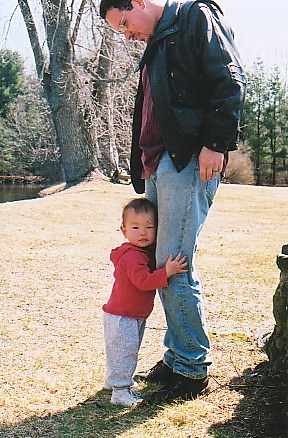|
Well actually here I am at home this morning, might as well write a post I've been thinking of for a few days. It concerns translation so I will ask LanguageHat to link to it. First topic: I found a book on my shelf the other day while looking for train reading, called The Following Story (Het Volgende Verhaal) by Cees Nooteboom (what a wonderful name! I wonder how it is pronounced.) I have a vague memory of coming into possession of this book, and it is dog-eared at p. 76, so I must have started reading it -- I took another go at it Tuesday. And a couple of subtle grammatical errors got me wondering -- is the translator (Ina Rilke) not fluent in English? Or is Nooteboom playing some kind of linguistic game that Rilke is rendering faithfully? For example: the first sentence of the second paragraph of the story begins, "I had waked up with the ridiculous feeling that I might be dead..." "Waked" can be baby talk in the usage "I waked up" but it does not sound like baby talk here, just like nonsense. I do not know any Dutch so I will put my question forth and hope someone reads this who is familiar with Nooteboom in the original. If you have answers, mail me. By the way, here is a very nice couple of sentences: I'm ashamed to say that after all those years on earth I still do not know the exact makeup of the human eye. Cornea, retina, iris and pupil, which double as flowers and students in crossword puzzles, that much I knew, but the actual substance, that vitreous mass of coagulated jelly or gelatine, has always struck fear into me. Whenever I use the word "jelly," everyone invariably laughs, but all the same Cornwall in King Lear had cried: "Out, vile jelly!" as he put out Gloucester's eyes, and that is precisely what I had in mind when I squeezed those sightless spheres which either were or were not my eyes. A lovely passage -- but note "those" in the first sentence. Seems to me like it should be "these". Again -- is this from the original or from the translator? (Note -- very cool that the crossword puzzle joke works in both Dutch and English. I am assuming it worked without too much fiddling about on Rilke's part; if I am wrong and she did have to take liberties to get it to work, well, she did a very good job of it.)We visited Ellen's friend Alice the other day and gave her son Steven Demian as a Hanukkah present. Ellen had asked what I thought would be a good book for him -- he is studying German and is reading Camus -- so I thought Demian was a good idea. It is the first book I ever read in German, anyway the first one I was ever able to actually finish. We gave him my copy, plus a translation. I had a look at the beginning of it and found it fascinating as ever, and indeed highly legible. But here's what's interesting -- the German sounds great and a bit profound to my ears -- but when I try rendering it in English it seems a lot less profound, nearly banal. I don't think this is because I am a lousy translator, though I am; when I looked at the translation which we bought for Steven, its phrasing was pretty close to my own. So could the profundity which I am seeing in the original be something I am reading into it, inspired by the rush of being able to understand a foreign language? -- this is a pretty unusual experience for me. A number of people whom I respect have dismissed Hesse as not worthwhile for someone who is not a teenager. (Which either way, Steven is, so I'm covered there.) Any thoughts? Update: LanguageHat advises me that I am mistaken here: "waked" is a standard past participle of "wake", used more commonly in Britain than in the U.S. And he thinks "those" is acceptable in the longer exerpt. I'd still be interested to know more about the original text that was translated as "after all those years".
posted morning of December 25th, 2003: Respond
➳ More posts about Hermann Hesse
|





